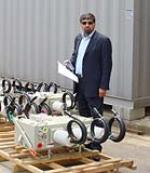Electrical Safety
- Do not touch electrical power lines that have fallen... they may be energized.
- Never climb on electric utility structures or reach into electric utility enclosures.
- Teach your children not to fly kites near power lines.
- Never use metal elevators, metal irrigation pipes, well digging equipment, metal ladders, or other metal equipment near power lines.
- Make sure that every family member knows the location of the main fuse or circuit breaker for the residence and understands how to operate it in case of an emergency.
- Electrical safety begins with proper wiring. Wiring should be installed and checked by a qualified electrician.
- Use Ground Fault Interrupters (GFI) for receptacles near water, outdoors, in garages, and in unfinished basements.
- All appliances and electrical cords should carry approval of the Underwriters' Laboratory (UL) or some other authorized facility.
- If a fuse blows, it should be replaced by one of the proper size.
- Never bypass or put anything behind a fuse.
- Check cords for wear, especially at plugs and connections.
- Never disconnect an appliance by pulling the cord; always pull the plug.
- Electrical outlets for outdoor use should be weatherproofed.
- Major electrical appliances should have their own circuits.
- Do not handle or use appliances if you are wet or are standing on a wet surface.
- Power tools should have heavy duty cords.
General Safety Tips
- Electrical safety begins with proper wiring. Wiring should be installed and checked by a qualified electrician. Every home should have at least a 100-amp service (200-amp service or larger for homes heated electrically).
- All appliances and electrical cords should carry approval of the Underwriter's Laboratory (UL) or some other authorized laboratory.
- Plugs on electrical appliance cords should be the grounded, three-prong type.
- Check cords for wear, especially at plugs and connections.
- Keep cords away from heat and water. Do not wrap cords around any metal device or pipe. Keep cords out of the way so people won't trip over them.
- Never disconnect an appliance by pulling on the cord; always pull the plug.
- All convenience outlets should be grounded.
- Electrical outlets for outdoor use should be weatherproof.
- Every major appliance should have its own circuit.
- Do not use or handle appliances if you are wet or are standing on a wet surface. Do not use electrical tools or appliances outdoors if it is raining or is wet.
- Power tools should have heavy duty, grounded cords.
- Moisture resistant appliance cords should be used outdoors.
- Do not operate an electric lawn mower in wet grass.
- All antennas should be grounded.
- Teach your children not to fly kites near power lines.
- Do not touch electrical wires that have fallen…they may be energized.
- Never go inside the fence around a power substation.
- Never install metal objects, such as CB or TV antennas, closer than twice their height to the nearest electric power line.
- Never use metal elevators, metal irrigation pipes, well digging equipment, metal ladders, or other metal equipment near power lines.
- Make sure every family member knows the location of the main fuses or circuit breaker for the residence and understands how to operate it in case of an emergency.
+ نوشته شده در سه شنبه پانزدهم آذر ۱۳۹۰ ساعت 10:33 توسط رضا نيك پيام
|
 معرفی مختصر :
معرفی مختصر :